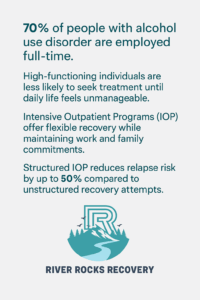I wore the mask of someone who “had it all together.” I could lead meetings, organize family dinners, and still smile at the end of the day. But inside, I was unraveling. Eventually, even “I’ve got this” became unbearable—and that’s when I found something that did me more good than I ever imagined: IOP.
The Mask Keeps You Afloat—Until It Doesn’t
High‑functioning addiction isn’t about darkness overtaking your life. It’s more insidious: you keep it together so well that no one notices—except you. You’ve arranged your drinking around deadlines. You’ve hidden hangovers behind witty remarks. You’ve become an expert at crisis management. But control isn’t strength; it’s pressure, waiting to blow.
IOP: A Smart Option for Smart People
Work continues. So does healing.
You don’t have to choose between your career and recovery. IOP at River Rocks Recovery is designed around life—after all, recovery happens in life. Sessions are structured in ways that allow you to keep your job, stay involved with family, and still take care of yourself.
Real therapy, not busywork.
Asking for help doesn’t mean sitting in a room being told what to feel or do. Therapy in IOP is solution‑focused and strategy‑based. We all bring goals, concerns, and setbacks. Every session is an opportunity to strengthen your ability to handle them—and prevent the ones you’re not ready for yet.
Peer support that resonates.
You don’t have to be broken to benefit from community. When you’re surrounded by people who “look put‑together” but feel fractured, vulnerability isn’t weakness—it’s gold. In group sessions, high‑functioning people share their wins and their cracks. That honesty builds trust—and tools.
From “I’ve Got This” to “I Need Help”: How That Shift Happens
Step 1: Recognizing the fatigue
Maybe you don’t look tired, but you feel tired. The energy it takes to maintain appearances becomes exhausting. My turning point? Showing up at a client meeting and realizing I’d rehearsed my slides five times—to distract from the hangover I felt coming on.
Step 2: Allowing yourself to be human
We get comfortable spinning stories: “I’ll taper off next week.” “I’ll just drink on weekends.” “This is just a phase.” But none of them work when you’re already juiced on adrenaline. IOP invites you to pause that story and be honest—with yourself, and with other people who get it.
Step 3: Choosing structured support
What IOP gave me was a container. It wasn’t a cage. It was time carved out for recovery, with tools to handle real life. Therapy sessions, group check-ins, skill workshops—they gave me a place to reload, not retreat.
The Game‑Changing Elements of IOP
Consistency without chaos
Every week, I knew where I’d be and who I’d see. That predictable space became a lifeline in my unpredictable world.
Toolbox for life
It wasn’t just about quitting alcohol or drugs. It was about learning:
- Which stressors trigger me.
- How to manage cues without coping with substances.
- What honest connection really feels like.
Integration back into “normal”
Every time I left a session, I practiced new tools in the real world. That integration made IOP more than a support group—it made it training ground for life.
How IOP at River Rocks Recovery Works in Middletown, Ohio
Personalization is key
No two high‑functioning people are the same. We start by understanding your life—work schedule, family obligations, stress triggers. We build the program around that.
Evidence‑backed therapy
We use cognitive‑behavioral techniques and skill-based approaches to help you manage thoughts, stress, cravings, moods. Therapy is not abstract—it’s immediately practical.
Community that understands
You’re not the only one juggling performance and pain. In group therapy, you’ll meet others walking the same line. That relatability makes trust easy—and opening up possible.
Continued support
Finishing IOP isn’t an end—it’s a milestone. Aftercare and alumni programming offer ongoing connection and resources. We leave the door open, not slam it shut.
A Metaphor: Recovery as Renovation, Not Demolition
Your life isn’t a house that needs to be torn down. It’s a structure under renovation. The foundation is there. The structure works. You just need some new wiring, a brighter paint job, and better insulation. IOP gives you the renovation tools—so you can stay living there while the improvements happen.
FAQs for High‑Functioning People Considering IOP
1. Is IOP really designed for people who still “have it together”?
Absolutely. IOP is built for people who manage careers, families, and obligations—but also know that “managing” is no longer enough. It’s where high-functioning meets healing.
2. Will I fall behind at work?
Not at River Rocks. IOP sessions are scheduled with your needs in mind—early morning, evenings, or mid-day blocks. We work with you, not against you.
3. Do I have to share personal details in group?
You share what you’re comfortable with. Many high-functioning individuals benefit from observing first. Sharing happens at your pace—with no pressure.
4. How long will I be in IOP?
Typically, 8–12 weeks. But personalization is everything. You stay as long as you need to build tools strong enough to handle real life.
5. What if I don’t feel “sick enough”?
You don’t have to. Feeling stuck, exhausted, or overwhelmed is enough reason. IOP isn’t about being “sick.” It’s about being human.
6. What happens after I finish?
You leave with a plan. That plan includes aftercare, alumni events, connections to local recovery groups, and check-ins to keep you on track.
Breaking the Silence in Middle Ohio
Middletown, and the surrounding area—including Hamilton, Ohio—has plenty of high-performing people quietly struggling. They show up, deliver results, smile—and inside, they’re hurting. River Rocks Recovery is paying attention.
- You don’t have to move away for help.
- You don’t have to claim rock bottom.
- You can get support while staying connected to the people and places you love.
Looking for IOP in Hamilton, Ohio? Reach out. A conversation starts before the shift begins.
When You Realize “I Need Help”
That moment is a turning point. Maybe it’s the hangover that won’t quit, the hide-and-seek with your emotions, or the guilt that follows cracks in your “everything’s fine” routine. That moment doesn’t mean failure. It means opportunity.
IOP is how you catch yourself before everything falls apart. It’s proactive. It’s strategic. It’s for people who want to keep building—and that includes you.
Take that next step.
Call (888) 905-6281 to learn more about our IOP services in Middletown, Ohio.





























